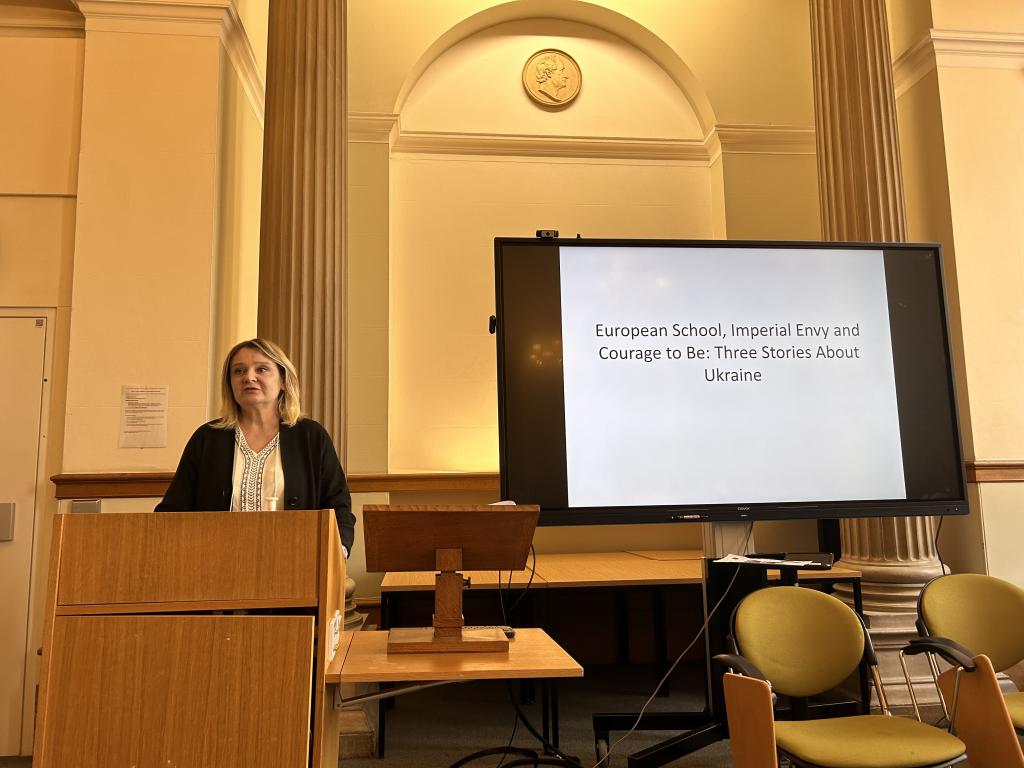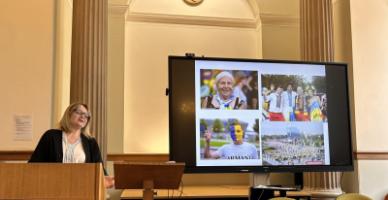
On 18th May, which coincidentally also both Ukrainian Vyshyvanka Day (a day celebrating Ukrainian folk culture) and the Day of Remembrance of the Crimean Tatar Deportation, the Faculty’s virtual writer-in-residence Olena Stiazkhina spoke at the Slavonic Studies Research Seminar. A writer and historian, Stiazhkina has published eleven works of fiction in Ukrainian and Russian, alongside over ninety pieces of academic writing. Sadly only one of her works currently available in English: Zero Point Ukraine, a collection of essays on the Ukrainian perspective of the Second World War. However, her novel Cecil the Lion Had to Die will be published in October this year, whilst her account of the early years of Russian aggression in eastern Ukraine, Ukraine, War, Love: A Donetsk Diary, will be published in August. She is one of Ukraine’s most popular contemporary fiction writers and has been the recipient of numerous awards in Ukraine and, prior to 2014, Russia, including PEN Ukraine’s Vasyl Stus Award for special contribution to Ukrainian culture in 2014.
Stiazhkina is a native of Donetsk, from where she was forced to flee with her entire family in 2014, when Russia’s aggression against Ukraine began. She is currently based in Kyiv. On top of all her other achievements, Stiazhkina has the honour of being number 21 on the List of enemies of the people of Donetsk, a list drawn up by the occupying forces of her home city of Donetsk. ‘It’s not a high position’, she complained; ‘I would like to be number twenty’.
Stiazhkina’s talk, in the form of three stories, stretched from the Scythians, whose ‘baba’ statues can still be found across the east of Ukraine, through the Greeks, Vikings, and Cossacks. She gave an in-depth account of the impacts of the genocidal Holodomor famine, which claimed the lives of 3.9 million people – 13% of Ukraine’s population – as well as exploring the situation in present day Ukraine and envisioning its victorious future. A historian by training, she pointed out the origin of the ‘churpryna’, a traditional Cossack hairstyle of a single plume of hair on an otherwise bald head, first promoted by the Viking prince of Kyivan Rus’, Prince Sviatoslav. This hairstyle is still worn in Ukraine in the twenty-first century, including by Vasyl Slipak, a Ukrainian opera singer who performed with the Paris Opera and was the winner of Best Male Performance in 2011 at Armel International Opera Competition and Festival. Slipak was shot dead by Russian-backed forces in Debaltseve, Donetsk Oblast, in 2016, whilst serving in the Ukrainian army. ‘This is not about a hairstyle’, Stiazkhina stressed to us, ‘this is about an unbroken tradition of being a fighter’.

As well as heart-breaking reminders of the extent of sacrifice being undertaken by Ukrainians to protect themselves and the rest of Europe from Russia’s aggression, Stiazhkina made clear the ways in which the war has brought people together. In 2014, when armed militants began their insurgency in the east of Ukraine, Stiazhkina and a group of other Donetsk residents came together; they ran an underground newspaper, Donetsk speaks, and launched a parody referendum on returning Donetsk to the UK (the city was founded by John Hughes, a Welshman, and was originally called ‘Yuzovka’ or ‘Yuzivka’ in his honour). ‘We demand a referendum on the return of Yuzivka to its original motherland – Great Britain! Glory to John Hughes and his city! God save the Queen!’ they declared. Among those with whom Stiazhkina, a proud smoker, teamed up in the early days of war was a local anti-smoking activist, whom she had always considered with great animosity. Somehow, in the chaos of necessity that came with the war, they ended up together, on the frontlines in 2014, delivering cigarettes to the Ukrainian soldiers defending their land.
As is perhaps inevitable in talks with (formerly) Russophone Ukrainian writers, and even more so in a talk at a language faculty, eventually the linguistic question came up. Stiazhkina, like many of her former Russophone Ukrainian colleagues, now writes entirely in Ukrainian, a change she made in 2014—and she is certain that hers will be the last generation of her family to speak Russian. She was keen to stress that this decision is entirely her own, and that any suggestion that it is happening under duress from the state are false. Inevitably, she continues occasionally to dream in Russian, but those dreams are consistently nightmares. Ukrainian for her has become a language of safety and of security, a sign of solidarity and togetherness between the Ukrainian people. As she also pointed out, the newspaper that she and her fellow pro-Ukrainian activists founded in Donetsk in 2014 was in Russian, adding another nail into the coffin of the Russian propagandists’ argument that they are somehow ‘liberating’ Russophone Ukrainians. This Russian speaking writer from the Donbas, whom the Russian state has twice claimed to be ‘liberating’ through its violence, now keeps a Molotov cocktail on the windowsill of her flat in Kyiv, lest the ‘liberators’ ever come too close again.
Turning to the future, Stiazhkina remarked that John Hughes was fifty-five when he moved to the Russian Empire and founded what is now Donetsk, the same age that she is now. Stiazhkina is tired, as all Ukrainians are now, nine years into war, a year into the full-scale invasion. She is confident though, that when victory comes, she will find the energy to go home, back to Donetsk, and rebuild her home, and the rest of Hughes’ Ukrainian city.
The talk ended with a tribute to Viktor Onysko, a Ukrainian filmmaker who was killed whilst serving in the Ukrainian armed forces in December 2022, aged 40. His final social media post, which Stiazhkina likened to Ukraine’s national poet Taras Shevchenko’s Testament, reads: ‘the very phrase if not me, who? has become very tangible. All these hopes for the professional military, for the Lendlease… There is nobody but me. I am the chosen one. And even if it is the apocalypse, I don’t want to meet it sourly. Everything will be Ukraine!’